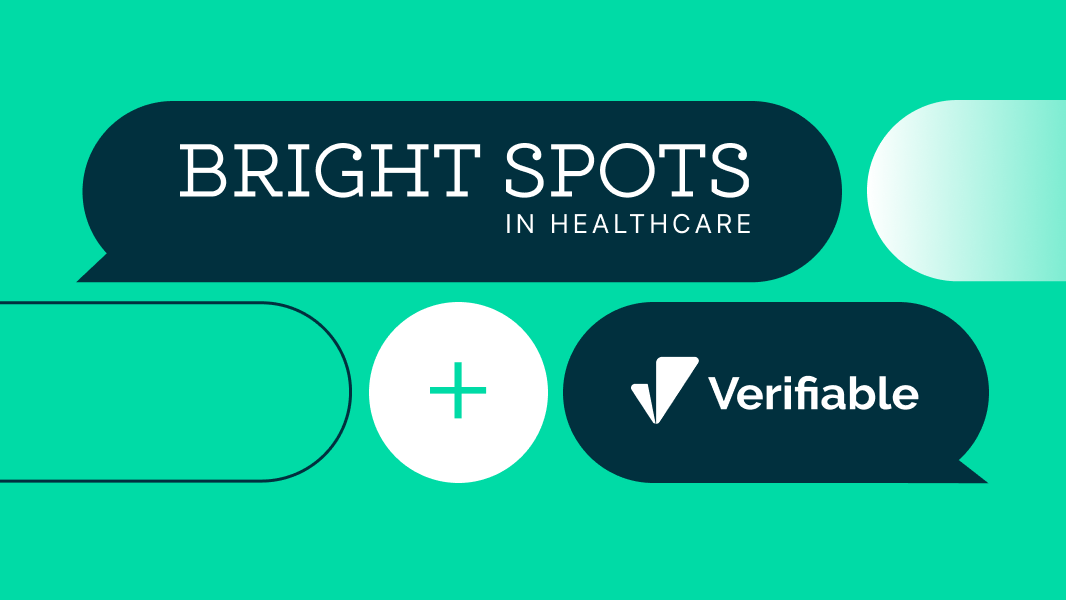Healthcare delivery models have undergone significant transformations over the last few years, but the COVID-19 pandemic prompted a serious jolt to the landscape. In particular, 2020 accelerated the ramp-up of telehealth technology adoption to support virtual visits. Last year's surge was, of course, unprecedented — with nearly 50% of all physicians in the U.S. treating patients through telehealth platforms within six weeks of the first COVID-19 outbreak.(1)
For companies' existing provider networks, skyrocketing demand has created significant strains and made provider network expansion a market imperative. The need for streamlined, secure telehealth operations has squarely jumped from the "nice to have" to "need to have" categories for health-focused companies. With an expanded playing field always comes an expanded set of market players — and the virtual care space faces unique challenges when it comes to verification, credentialing and other provider-related services. Specifically, these unique challenges include:
- Immense growth. The pandemic accelerated an already growing demand for virtual care services — and there is no indication that this demand will contract even as the world continues to open.
- Nascent processes. Technology and operationalization are still evolving — ensuring adequate exchange and synchronization of complex healthcare data across different healthcare systems can be complicated and inefficient.
- Competition for provider talent. Virtual care companies are competing to attract and retain health providers — who are already in limited supply — to administer telehealth services.
- Experience expectations. Virtual care providers must ensure technology experiences and interfaces are user-friendly to match consumer expectations, but interoperability issues have created complications in facilitating the seamless experience consumers expect.
These emerging challenges for virtual care companies are giving rise to emerging healthcare IT solutions. In particular, companies are looking to leverage flexible, scalable application programming interfaces (API) to help integrate and configure operations to live in the systems and workflows they are already using.
The Role of APIs in Scaling Virtual Care Services
The value add of APIs has come into the spotlight amid the healthcare delivery changes stemming from the pandemic. Still, the need for health IT interoperability will only continue to expand as systems and needs become more complex.
Whether you are a health information company looking to enable web and mobile access to diagnostic tools, a research institution searching for innovative ways to connect with physicians and patients, or a hospital or healthcare practice requiring faster, more up-to-date patient information, APIs can make it easier for you to interact with your target audience.
When it comes to establishing viable telehealth services, the initial investment in technology is just the beginning. Building a sustainable, successful telehealth program requires a holistic plan to implement, operationalize, optimize, manage, and maintain an effective healthcare IT infrastructure that meets the complex requirements and evolving needs of the care delivery system. The infrastructure must, of course, support and optimize the traditional requirements and workflows — including licensing and credentialing, clinical and operational workflows, provider management and quality control of data. Beyond that, digital care companies have new, distinct considerations for healthcare IT, including:
- High-scale performance and reliability
- Interoperability
- User experience
- Availability to API/trade partner
Investment and integration of a secure, governable API platform designed for innovation is instrumental for succeeding in a market as dynamic and telehealth.
Reducing Manual Workflows
Back office operations for healthcare companies have traditionally relied on outdated, manual processes. In the digital care delivery environment, companies relying on manual processes are at risk for exacerbating already-existing pain points — including delays stemming from initial data errors and a poor user experience that can lead to drop-offs. Healthcare APIs can resolve these and other pain points. For example, leveraging a provider data API like Verifiable reduces unnecessary touchpoints and significantly streamline onboarding operations for organizations - including instant license verifications during onboarding and pre-population of provider data during the credentialing process. The time savings associated with API directly translate into cost savings — with some estimates showing a price tag of $10,122 for even a one-day delay in provider onboarding.(2)
Telehealth companies and medical groups integrating virtual services into their offerings need to invest in strategies and solutions to keep up in this dynamic market. API solutions help drive down costs, support revenue growth and accelerate the provider enrollment process.
Industry-leading Organizations Leverage Verifiable for Rapid Scalability
The demand for mental health services, in particular, has surged amid pandemic-related uncertainty, anxiety and grief. One recent study found that, in the United States, the proportion of people reporting negative behavioral health impacts stemming from COVID-19 increased from 32% to 53% between March and July 2020.(3)
Teletherapy providers have, in turn, experienced record uptake since March 2020, and the need for mental health support appears to be ever-growing as patients continue to confront the stressors of the pandemic and social crises. Organizations offering these services have largely risen to the occasion and embraced tech-savvy practices. However, many still rely on outdated, manual processes for provider credentialing and other back-end infrastructure needs.
To keep up with this demand, organizations needed to leverage new strategies to bring greater efficiency to provider onboarding and other back-office operations. In response, solutions like Verifiable’s enterprise-grade API have leveraged modern data practices to connect to hundreds of primary sources for automated credential verification and compliance monitoring. Verifiable's platform — designed for simplicity and easy integration into existing systems — offers customizable solutions to support scalable credentialing operations without bottleneck growth.
Several industry-leading behavioral health companies, such as Talkspace, Lyra Health and NOCD, have leveraged Verifiable platforms for scaling solutions.
Verifiable Impact: Significant Operational Improvements While Leveraging Existing Platforms
In one case, an emerging behavioral health company partnered with Verifiable to document existing needs, outline goals and co-design an integrated workflow that automates provider license verifications. Verifiable recognized the importance of working closely with the organization’s onboarding tool and partnered closely to ensure the solutions succeeded in meeting outlined needs.
As a result of the partnership, this company was able to realize the following operational benefits:
- Smoother provider onboarding through automatic provider license verifications, which dramatically shortened candidate provider screening times, lowered operating costs and delivered a more seamless user experience.
- Reduced operational workflow pain points through automation, including fewer inefficiencies related to ongoing verification and monitoring efforts.
- Optimized, real-time data quality operations, including improved upfront data collection and verification operations — even while leveraging already —existing systems and infrastructure.
The organization's partnership with Verifiable is credited for cutting intake requirements by 50% and reducing candidate provider screening times from three days down to three minutes.
Verifiable Impact: Up-to-date Provider Data Automated and Integrated Directly Within Salesforce
Another industry-leading behavioral health company turned to Verifiable to develop a Salesforce integration to automatically monitor and keep provider profiles up-to-date. The organization had initially contracted a large legacy Credential Verification Organization (CVO), and over time it became clear the CVO would not be able to deliver on this or most other complex needs in a cost-effective or timely manner.
This organization was able to achieve the following gains through Verifiable’s agility and integration expertise:
- Automated, seamless integration of up-to-date provider data into Salesforce
- Increased data quality and ownership of essential provider data
- Ability to rapidly scale and reduce once-lagging turnaround times
- Flexibility for go-forward optimization and innovation by circumventing the CVO's siloed, clunky limitations and costly operations
Verifiable for Your Virtual Healthcare Operations
While vaccine approvals and rollouts may be increasing optimism about the timeline for a return to relative normalcy, healthcare consumption behaviors have undoubtedly changed forever. Telemedicine will continue to have a role on the healthcare delivery spectrum, and the industry winners will be those who continue investing in operational infrastructure advancements in service of promoting the smoothest possible user experience for providers.
Streamlined provider credentialing has become a strategic imperative for any telehealth organization looking to capture the market of providers looking to meet patients where they are - during the pandemic and beyond. Verifiable’s enterprise-grade API is designed for simplicity and easy integration into your existing systems — supporting scalable credentialing operations without bottleneck growth.
References
(1) Merritt Hawkins. “Survey: Physician Practice Patterns Changing As A Result Of COVID-19.” Accessed March 8, 2021.
(2) Merritt Hawkins. “2019 Physician Inpatient/Outpatient Revenue Survey.” Accessed March 8, 2021.
(3) Nirmita Panchal, et. al., “The implications of Covid-19 for mental health and substance use,” KFF, August 21, 2020.
Learn more about the benefits of the Verifiable API and other Verifiable products designed to enhance your credentialing and monitoring options.

.svg)




